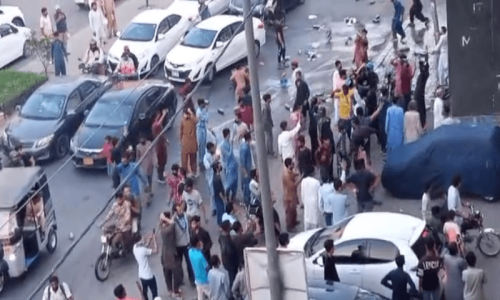WASHINGTON: Atomic scientists on Tuesday moved their “Doomsday Clock” closer to midnight than ever before, citing Russian nuclear threats amid its invasion of Ukraine, tensions in other world hot spots, military applications of artificial intelligence and climate change as factors underlying the risks of global catastrophe.
The Bulletin of the Atomic Scientists set the clock to 89 seconds before midnight — the theoretical point of annihilation. That is one second closer than it was set last year.
The Chicago-based nonprofit created the clock in 1947 during the Cold War tensions that followed World War Two to warn the public about how close humankind was to destroying the world.
“The factors shaping this year’s decision — nuclear risk, climate change, the potential misuse of advances in biological science and a variety of other emerging technologies such as artificial intelligence — were not new in 2024. But we have seen insufficient progress in addressing the key challenges, and in many cases this is leading to increasingly negative and worrisome effects,” said Daniel Holz, chair of the Bulletin’s Science and Security Board.
Chicago-based nonprofit created the clock to warn how close humankind can be to destroying the world
“Setting the Doomsday Clock at 89 seconds to midnight is a warning to all world leaders,” Holz added.
Factors behind adjustment
Russia’s 2022 invasion of Ukraine launched Europe’s bloodiest conflict since World War Two. “The war in Ukraine continues to loom as a large source of nuclear risk. That conflict could escalate to include nuclear weapons at any moment due to a rash decision or through accident and miscalculation,” Holz said.
The Middle East has been another source of instability with the Israel-Gaza conflict and broader regional hostilities involving countries including Iran. Nuclear-armed China has stepped up military pressure near Taiwan, sending warships and planes into the waters and air space around the island that Beijing views as its own territory. Nuclear-armed North Korea continues with tests of various ballistic missiles.
“We are watching closely and hope that the ceasefire in Gaza will hold. Tensions in the Middle East including with Iran are still dangerously unstable,” Holz said. “There are other potential hot spots around the world, including Taiwan and North Korea. Any of these could turn into a conflagration involving nuclear powers, with unpredictable and potentially devastating outcomes.”
Artificial intelligence made rapid gains in capability and popularity in 2024, prompting increasing concern among some experts about its military applications and its risks to global security. Governments have addressed the matter in fits and starts.
Published in Dawn, January 29th, 2025















































